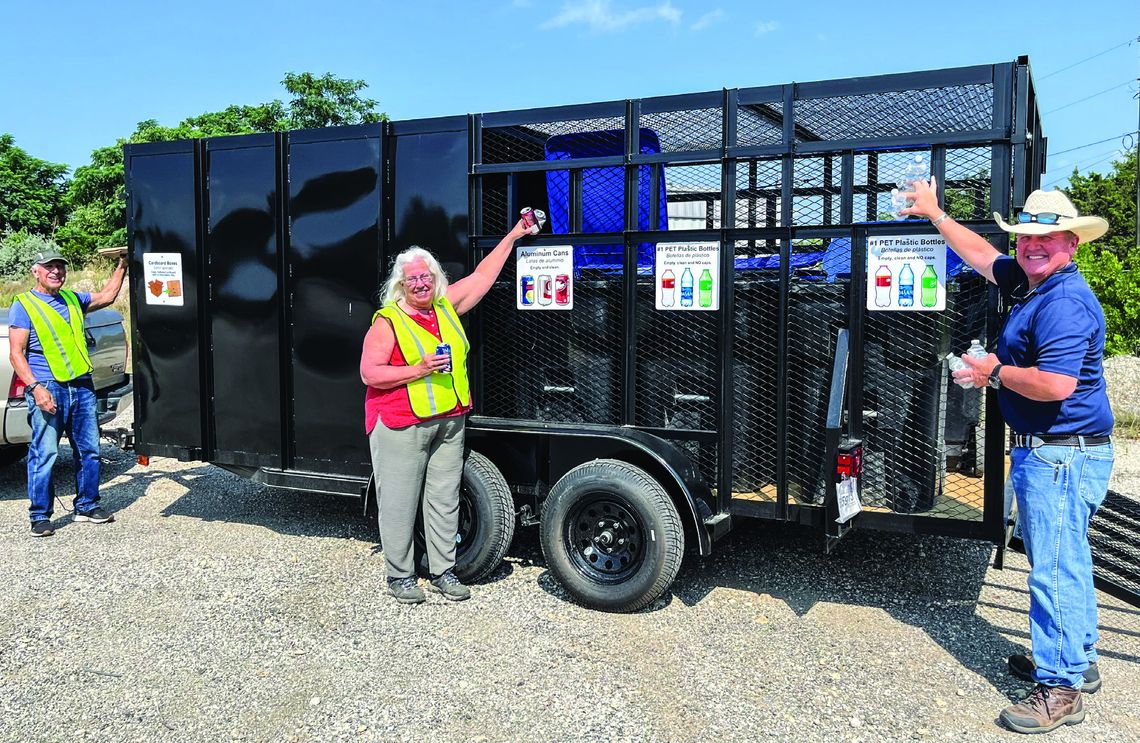Let’s talk trash—the trash that can be recycled and repurposed. And let’s talk about the recycling in Bandera County.
Most commercial trash collection services in Bandera County do not recycle. That may be changing since a couple of small local collectors are now picking up recycling alongside the trash. For the past year and a half, however, county residents had only one option: carry recyclables to the recycling center next to Mansfield Park.
As reported in last week’s Bandera Bulletin, Commissioner Jody Rutherford invited volunteers from DON’T MAKE WASTE BANDERA (DMWB) to the Commissioners Court meeting on June 13 to discuss their progress in kick-starting recycling in the county. Janus Olive, recycling coordinator, reported that, in less than a year and a half, they:
• formed a nonprofit corporation and trained more than 40 volunteers to collect, screen and bale recyclables from 4,481 customers;
• obtained a grant from H-E-B to repair three of the four balers;
• baled 42 tons of aluminum cans, #1 plastic bottles and corrugated cardboard; and
• sold $6,570 of recyclable materials and have another estimated $1,705 in storage.
Each Bandera County precinct has a solid waste site. The only one with recycling is Precinct 4, under Commissioner Jody Rutherford. To facilitate the transfer of recyclable materials from the other three precincts to the recycling center, DMWB obtained a grant from H-E-B through Keep Texas Recycling (KTR) to design and build a recycling trailer. KTR is a statewide program within Keep Texas Beautiful that has focused on expanding and improving rural recycling programs for 30 years.
With the cooperation of Commissioner Greg Grothues, the RECYCLEmobile will be rolled into Precinct 2 (Lakehills) on Saturdays, beginning July 6 from 9-12 am and 1-4 pm. The RECYCLEmobile is also available for use at large public events to collect recyclables approved for sale by the county.
Recycling is a collaborative effort among the county, DMWB and KTR. KTR keeps track of the current market for recycled materials and schedules shipments to the buyers. DMWB volunteers receive materials, screen for cleanliness, check the numbers on the plastics, sort and bale them. The county owns and repairs the equipment and storage facility.
Some materials are more valuable than others on the open market. While prices are always changing, the current (March) market price per ton for aluminum cans is $1,080, six times greater than for #1 plastic bottles and ten times greater than corrugated cardboard.
Since plastic is cheap and easy to produce, plastic trash has fewer markets. The choice to limit recycling to these three materials is not only based on their current market value, but also by considering factors such as the material’s cleanliness and ability to handle and bale the materials and the volume used by the public. Wet cardboard produces mildew and unrinsed milk bottles attract rats during storage.
Plastics are flooding the market as new forms of polymers are developed for packaging, drinks, food containers and shipping materials. Less than 5 percent of plastics marketed get recycled and the percent is declining as more plastic is being produced. The industry plans to triple plastic production by 2050. The World Economic Forum estimates that by then the amount of plastic trash will exceed the pounds of fish in the ocean.
While all plastics numbered 1-7 can technically be recycled in some way, the only reasonable choice for the recycling market are numbers 1 and 2.
#1 PET (Polyethylene Terephthalate) is used in the production of plastic water and soft drink bottles, salad dressing containers, plastic peanut butter jars and food clamshell containers. These can be recycled into fiber fill for sleeping bags, carpets and rope.
Is it worth all those volunteer hours, the miles they drive to recycle and the cost of repairing the balers? Funds raised from recycling sales must be used only for recycling. The invoice to the April shipment alone reports that we sold $3,174 in aluminum cans and $1,129 in PETE plastic bottles. That $4,303 pales in comparison to the environmental savings: 139 trees, 33,497 kilowatt hours of electricity, 57,190 gallons of water, 27 cubic yards of landfill and estimated landfill fees of $245.
Zoe Killian, KTR program director, reminds us that recycling is only one small part of an integrated approach to sustainable and responsible solid waste management.
Robert Brischetto is president of DON’T MAKE WASTE BANDERA, a public charity that promotes volunteer efforts to recycle, clear trash in the yards of elderly disabled and trash on the roads of Bandera County. You can volunteer by sending an email saying how you want to help to: dontmakewastebandera@ gmail.coom. Or make a contribution on their Facebook page (Bandera Recycles) or website: DMWB.net.





.png)
